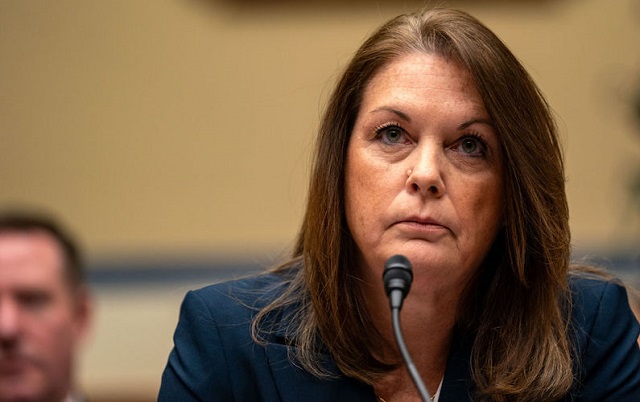International
Secret Service Director Kimberly Cheatle resigns after major backlash over Trump assassination attempt

United Sates Secret Service Director Kimberly Cheatle testifies before the House Oversight and Accountability Committee during a hearing at the Rayburn House Office Building on July 22, 2024 in Washington, DC.
Kent Nishimura/Getty Images
From LifeSiteNews
Secret Service Director Kimberly Cheatle has finally announced she will step down after being roundly slammed by a bipartisan committee during a congressional hearing for her failure to prevent the assassination attempt on Donald Trump.
U.S. Secret Service Director Kimberly Cheatle has stepped down amid resounding, bipartisan calls for her resignation by congressmen following the assassination attempt on former President Donald Trump.
Three sources confirmed to NBC that Cheatle officially resigned on Tuesday morning. In her letter of resignation, shared by a senior official, Cheatle wrote that she takes “full responsibility for the security lapse.”
“In light of recent events, it is with a heavy heart that I have made the difficult decision to step down as your Director,” she wrote.
President Joe Biden said in a statement following Cheatle’s announcement of her resignation that he will appoint a new head of Secret Service “soon.” He has ordered an “independent review” to investigate the day’s events.
In response to Cheatle’s resignation, Trump wrote on Truth Social: “The Biden/Harris Administration did not properly protect me, and I was forced to take a bullet for Democracy. IT WAS MY GREAT HONOR TO DO SO!”
Her decision comes a day after being grilled under subpoena by Republican and Democrat members of the House Oversight Committee, who ripped her both for the grave Secret Service lapse that allowed Trump to be shot and for her refusal to answer simple questions during the hearing.
The leading Democrat member of the panel, Rep. Jamie Raskin (D-Md.), accused Cheatle of having “lost the confidence of Congress at a very urgent and tender moment in the history of the country.”
Rep. Nancy Mace (R-S.C.) slammed Cheatle as “full of s***” and “completely dishonest” for not giving direct answers to questions, including about providing “audio and video recordings” in her possession that were taken the day of the Trump assassination attempt.
“How did a 20-year-old loner with a week’s notice pick the absolute best location to assassinate President Trump when the entire Secret Service missed it?” asked Rep. Pat Fallon, R-Texas. “Director Cheatle, on your leadership, your agency got outsmarted and outmaneuvered by a 20-year-old. How can we have any confidence that you could stop trained professionals from a nefarious nation state?”
The Secret Service director was unable to provide explanations as to why the roof used by Crooks to shoot at Trump was not secured the day of the shooting and why Trump was allowed to speak on stage while the Secret Service was aware that a suspicious man was present on the grounds that day. At one point, she claimed she did not “have the timeline of how the individual accessed the roof, where they accessed the roof, or how long they were on the roof.”
She said, however, that all the security resources requested “for that day” were provided.
Cheatle resisted calls to resign prior to Tuesday, with a Secret Service spokesperson declaring last week that she had no intention to resign even after mounting calls for her to step down.
Critics across the board have described the security breach at Trump’s Pennsylvania campaign rally as a “catastrophic failure” of the Secret Service. Video footage emerged online of attendees from the Trump rally alerting police to the gunman, 20-year-old Thomas Matthew Crooks, positioned on a roof toward the rally stage, highlighting one of many security failures that day to prevent the assassination attempt. One man present that day told the BBC he was “pointing” at the gunman on the roof for two or three minutes.
Counter-snipers fatally shot Crooks after one of his shots grazed the former president’s right ear, bloodying him. However, Crooks killed a rally attendee, identified as 50-year old Corey Comperatore, a former fire chief. Two other Pennsylvania residents were shot, but are reportedly in stable condition.
Business
DOOR TO DOOR: Feds descend on Minneapolis day cares tied to massive fraud

Federal agents are now going “DOOR TO DOOR” in Minneapolis, launching what the Department of Homeland Security itself describes as an on-the-ground sweep of businesses and day-care centers tied to Minnesota’s exploding fraud scandal — a case that has already burned through at least $1 billion in taxpayer money and is rapidly closing in on Democrat Gov. Tim Walz and his administration.
ICE agents, working under the umbrella of the Department of Homeland Security, fanned out across the city this week, showing up unannounced at locations suspected of billing state and federal programs for services that never existed. One day-care worker told reporters Monday that masked agents arrived at her facility, demanded paperwork, and questioned staff about operations and enrollment.
“DHS is on the ground in Minneapolis, going DOOR TO DOOR at suspected fraud sites,” the agency posted on X. “The American people deserve answers on how their taxpayer money is being used and ARRESTS when abuse is found.”
DHS is on the ground in Minneapolis, going DOOR TO DOOR at suspected fraud sites.
The American people deserve answers on how their taxpayer money is being used and ARRESTS when abuse is found. Under the leadership of @Sec_Noem, DHS is working to deliver results. pic.twitter.com/7XtRflv36b
— Homeland Security (@DHSgov) December 29, 2025
Authorities say the confirmed fraud already totals roughly $300 million tied to fake food programs, $220 million linked to bogus autism services, and more than $300 million charged for housing assistance that never reached the people it was meant to help. Investigators from the FBI, Justice Department, and Department of Labor have now expanded their probes after a viral investigation exposed taxpayer-funded day cares that received more than $1 million each while allegedly serving few — or zero — children.
One of the most glaring examples, the Minneapolis-based Quality “Learing” Center — infamous for its misspelled sign — suddenly appeared busy Monday as national media arrived. Locals told reporters the center is typically empty and often looks permanently closed, despite receiving about $1.9 million in public funds. State inspection records show the facility has racked up 95 violations since 2019. Employees allegedly cursed at reporters while children were bused in during posted afternoon hours.
DHS officials say the “DOOR TO DOOR” operation is deliberate. In videos released online, agents are seen questioning nearby business owners about whether adjacent buildings ever had foot traffic, whether they appeared open, and whether operators used subcontractors or outside partners to pad billing. DHS Secretary Kristi Noem posted footage of agents pressing workers about business relationships and transportation services used by suspected fraud sites.
“This is a large-scale investigation,” DHS Assistant Secretary Tricia McLaughlin told the New York Post, confirming that Homeland Security Investigations and ICE are targeting fraudulent day-care and health-care centers as well as related financial schemes.
FBI Director Kash Patel warned that what investigators have uncovered so far is “just the tip of a very large iceberg.” He pointed to the bureau’s dismantling of a $250 million COVID-era food-aid scam tied to the Feeding Our Future network, a case that resulted in 78 indictments and 57 convictions. Patel has also made clear that denaturalization and deportation remain on the table for convicted fraudsters where the law allows.
Dozens of arrests have already been made across the broader scheme, many involving Somali immigrants, though federal officials stress the investigation targets criminal behavior — not communities. Some local residents say the scandal is hurting law-abiding families. One Somali Uber driver told reporters he works 16-hour days and is furious that “some people are taking advantage of the system,” making the entire community look bad.
Now, with federal agents going “DOOR TO DOOR” across Minneapolis, the era of polite indifference appears to be over. The message from Washington is blunt: the money trail is being followed, the paperwork is being checked, and the days of treating taxpayer-funded programs like an open vault are coming to an end.
Business
Feds pull the plug on small business grants to Minnesota after massive fraud reports

The Small Business Administration is moving to freeze grant money flowing into Minnesota after explosive allegations of large-scale fraud tied to state oversight failures, with SBA Administrator Kelly Loeffler signaling an immediate crackdown following recent independent reporting.
In a series of comments shared publicly by conservative commentator Benny Johnson, Loeffler said the agency is “cutting off and clawing back” SBA grants to the state while investigators dig deeper into what she described as a rapidly expanding fraud network.
Johnson wrote that Loeffler told him she was “disgusted and sickened” after reviewing footage from YouTuber Nick Shirley, whose on-the-ground reporting in Minnesota highlighted what he said were sham daycare and learning centers collecting millions in public funds despite showing little or no sign of legitimate operations.
According to Johnson, Loeffler blamed the situation on Democrat Gov. Tim Walz, accusing his administration of refusing to enforce basic rules governing small businesses and allowing fraud to flourish unchecked.
Johnson said Loeffler told him SBA investigators were able to identify roughly half a billion dollars in suspected fraud within days of focusing on Minnesota, calling the operation an “industrial-scale crime ring” that ripped off American taxpayers.
“Pending further review, SBA is freezing all grant funding to the state in order to stop the rampant waste of taxpayer dollars and uncover the full depth of fraud,” Loeffler said, according to Johnson’s account, adding that the total scope of the scheme remains unknown and could reach into the billions.
The controversy gained national traction after Shirley posted video of himself visiting multiple facilities, including a South Minneapolis site known as the Quality Learning Center, which he reported was approved for federal aid for up to 99 children but appeared inactive during normal business hours.
The center’s sign, Shirley noted, even misspelled the word “learning” as “learing.”
In the footage, a woman inside the building is heard shouting “Don’t open up,” falsely claiming Shirley and his colleague were Immigration and Customs Enforcement agents.
After the video circulated, Rep. Tom Emmer, a Republican, publicly demanded answers from Walz, questioning how such facilities were approved for millions in taxpayer funding.
Shirley’s reporting followed earlier investigations, including a November report by City Journal alleging that members of Minnesota’s Somali community had sent millions of dollars in stolen taxpayer funds overseas, with some of that money reportedly ending up in the hands of Al-Shabaab, a U.S.-designated terrorist organization.
While Walz’s administration has insisted it takes fraud seriously, the SBA’s decision to halt grant funding marks one of the most aggressive federal responses yet, underscoring how rapidly a local scandal has escalated into a national reckoning over oversight, enforcement, and accountability in Minnesota.
-

 Alberta2 days ago
Alberta2 days agoAlberta Next Panel calls to reform how Canada works
-

 International2 days ago
International2 days agoGeorgia county admits illegally certifying 315k ballots in 2020 presidential election
-

 Business2 days ago
Business2 days agoThe “Disruptor-in-Chief” places Canada in the crosshairs
-

 Artificial Intelligence2 days ago
Artificial Intelligence2 days agoUK Police Pilot AI System to Track “Suspicious” Driver Journeys
-

 Energy2 days ago
Energy2 days ago‘The electric story is over’
-

 Business2 days ago
Business2 days agoWarning Canada: China’s Economic Miracle Was Built on Mass Displacement
-

 Energy2 days ago
Energy2 days agoThe Top News Stories That Shaped Canadian Energy in 2025 and Will Continue to Shape Canadian Energy in 2026
-

 Daily Caller23 hours ago
Daily Caller23 hours agoUS Halts Construction of Five Offshore Wind Projects Due To National Security





